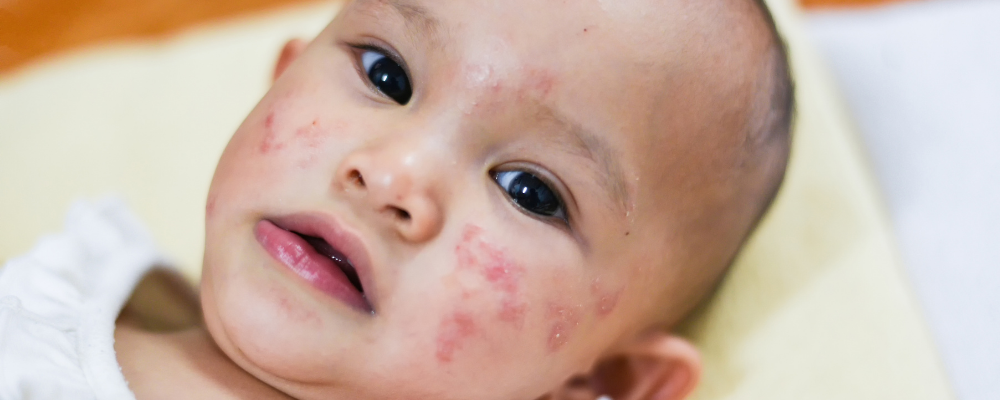
Ever fed your baby and shortly after you see red patches on the skin, or maybe overtime you notice the baby’s skin, getting pale, reddish or even swollen. Well that could be Eczema, it’s a complex, heartbreaking and frustrating condition.
What many do not know is that when we speak about babies and Eczema we majorly speak diet because it plays a major role in managing the symptoms. It therefore goes without saying that diet can either worsen or reduce inflammation when it come Eczema.
Let’s break the ice on what foods increase inflammation or triggers Eczema
- Dairy products
Every bit of the dairy products causes allergies on babies but it goes a notch higher on babies suffering from Eczema. Avoids cow milk, yoghurt and cheese. These foods trigger eczema faster than any other food. Research has it that 39% of kids suffering from Eczema react to dairy products instantly while others take a bit of time before flare-ups.
- Fish and shellfish
Shellfish is any aquatic animal with a shell like exterior, these includes Oysters, Crabs, Shrimp, lobsters and Mussels (more like sea food). On the other hand, the types of fish include Tilapia, Trout, Salmon, Nile parch and Tuna all of which have fins and scales.
One thing you shouldn’t forget is that both fish and shellfish are highly nutritious and is considered a great source of Omega-3 fatty acids and protein but then again they can also worsen Eczema symptoms on infants. This is mainly because their allergy levels are very high and common in a great percentage of infants suffering from Eczema and can cause a wide range of side effects, such as itching and hives. However not all types of fish may cause reactions, some may not also this varies from one baby to another,
- Soy products
Compared to other foods, Soy allergies are not very common, meaning not many experience it but the few who do also do not notice the symptoms in time, this is because it has an immune response. Soy products include, Tofu, Soy milk and Edamame. Having a sensitive response to Soy products means processed foods is a risk to the baby as most processed foods contain Soy-based ingredients, which could worsen symptoms of eczema.
- Eggs
Eggs is not just a food allergy on infants suffering from Eczema but on most children under the age of 5 in general. Some could have an allergy on the proteins found in egg whites while others in the yolks, whichever it is, eggs remain a number one trigger of Eczema symptoms. Study further affirms that infants suffering from eczema are 6 times likely to develop egg allergies which instantly triggers the eczema. Some overcome it by the age of 5 while others do not. Also note that some babies may be allergic to eating eggs directly but can entertain them if taken indirectly, like in pancakes or baked.
- Tree nuts
Tree nuts are your regular kind of nuts like Almond. Walnuts. Cashew and Pecans. They are known to worsen eczema in toddlers as they have a rapid and intense reaction. They cause the most serious and severe form of reaction ever seen on eczema babies. It’s intense in the fact that it can lead to either asthma or seasonal allergies. In addition to tree nuts you should also avoid feeding the baby with foods that contain tree nuts like, coconut products, pesto, nut butters, and selective cereals such as crackers, cookies, or candies.
- Wheat or Gluten
Wheat is a type of cereal grain and a staple ingredient in many foods, such as bread, pasta, and baked goods while Gluten is a specific protein found in wheat, barley, and rye that gives dough its structure and elasticity.
Wheat and Gluten is also a very rare kind of allergy, doesn’t affect many but the few who are allergic to them may notice a reaction after consuming wheat based products. The reactions caused may include, asthma, hives or digestive issues.
The Eczema and skin rashes can also be caused by a sensitivity to gluten, as well as by celiac disease which is an autoimmune condition that triggers an immune reaction when the baby consumes gluten-containing foods.
While there is no test available to diagnose non-celiac gluten sensitivity, your child’s pediatrician can use a skin or blood test to help determine if the baby has celiac disease or wheat allergy.
- Peanuts
Peanuts are a common allergen associated with several skin reactions, including rashes, itching and hives. It’s mostly common in toddlers and appears within the first 2 years after birth.
Extensively, research has it that peanut allergies are most common on infants with moderate to severe eczema. Naturally if peanuts cause flare-ups of eczema on your child, simply swap the ingredients with more accommodative ones like seed butter.
Eczema is sensitive and very difficult to manage in infants as many factors can contribute to severity of the infants’ symptoms but then wherever there is will there certainly is a way.
While foods do not directly cause eczema, making dietary changes could help reduce symptoms, especially for those who have a sensitivity or allergy to specific foods. However, it depends on the child’s particular allergies or sensitivities, so before you embark on this journey speak with a pediatrician or a dietitian to determine which foods might be best to eliminate because at the end of it all the child has to meet their nutritional needs.
